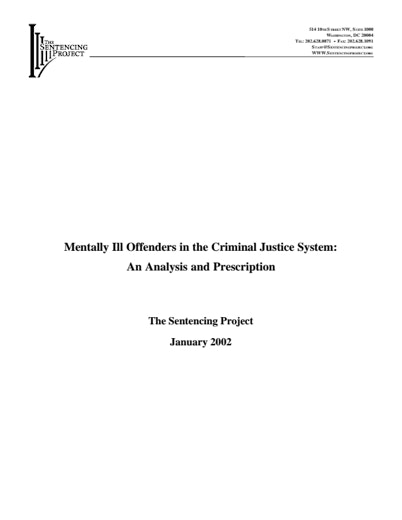At the beginning of the new century, the United States is the world leader in incarceration, with a higher proportion of its population behind bars than any other country. This distinction is primarily the result of policy decisions, in many areas and at various levels of government, and not rising crime rates. Incarceration has not proven to be the most effective strategy in reducing crime, and brings with it significant financial and social costs.
In response to this situation, The Sentencing Project is investigating sentencing, court, and corrections options for specific groups of offenders which are contributing to the burgeoning prison and jail population. For many of these groups—including offenders who are children, elderly, mentally ill, learning disabled, or terminally ill—there exist alternative approaches ("a better way") within and outside the criminal justice system that are more effective and less costly.
This report, an analysis of the "criminalization" of people with mental illness and its impact on the criminal justice system, is the result of work by The Sentencing Project's Campaign for an Effective Crime Policy. The Campaign was initiated in 1992 as a national effort of concerned criminal justice officials who issued "A Call for a Rational Debate on Crime and Punishment." The Call was subsequently endorsed by more than 1,400 criminal justice officials and policymakers throughout the country, and the Campaign produced a series of policy reports analyzing trends in the justice system and proposing recommendations for more effective public policy. The Campaign's functions have now been incorporated within The Sentencing Project. The purpose of the information and recommendations presented in this report is to inform the public debate and to be of use to criminal justice practitioners and state and local policymakers who are working to improve the effectiveness of government services.
Read more
Homicide Reduction
Q&A: How One Colombian City Is Tackling Violent Crime

Palmira, Colombia, is one of the most violent cities in the world. But a prevention program focusing on youth has reduced crime significantly—and earned it an international peace prize. The city’s mayor on what’s working.
In Remembrance
Lani Guinier’s Overlooked Education Legacy

The late Lani Guinier thought deeply about the intersection between education and criminal justice. Her leadership at Open Society helped pave the way to colleges across the country offering higher education to the incarcerated.
WOMEN'S RIGHTS
Challenging Mexico’s Abusive Preventative Detention System

Mónica Esparza’s case is one of the most notorious cases of extreme gender violence carried out by Mexican authorities. What her story teaches about how to combat the country’s scourge of gender-based violence.
